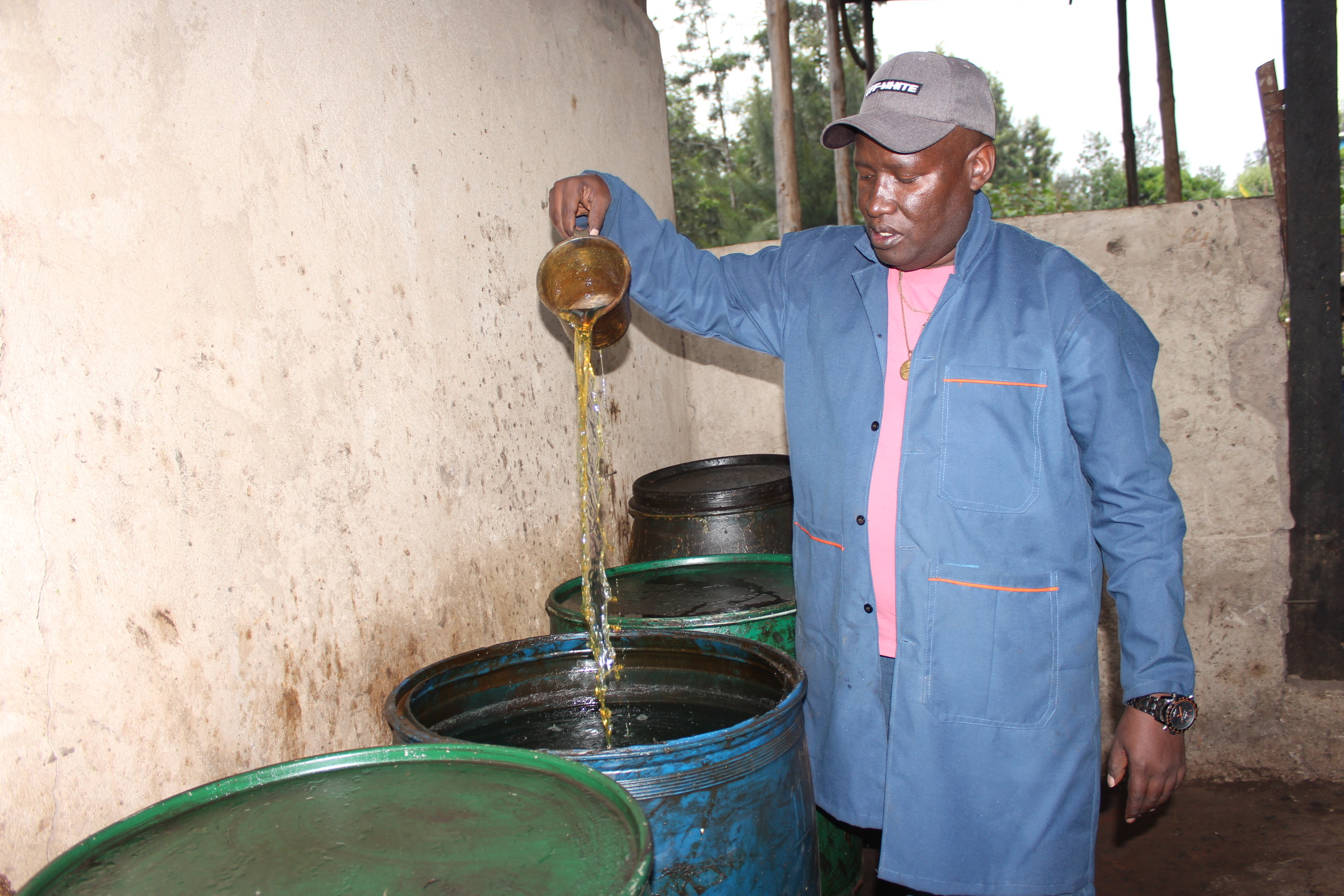

At a small factory tucked in the bustling Kenol town, a young man is quietly leading a green revolution driven by his passion for environmental conservation and energy sustainability.
James Muritu who holds a master’s degree in software and
hardware engineering recycles plastic waste into fuel, effectively tackling
the environmental pollution menace while at the same time offering a cheaper
alternative to conventional fuels.
Heaps of plastic materials characterise his compound, a vivid testament to his relentless efforts of turning trash into fuel cash.
The initiative has enabled him employ people, while at the same time conserving the environment.
“I was disturbed by the amount of plastics waste choking our environment not to mention the skyrocketing fuel prices. And so, I decided to find a solution that could address both problems at the same time,” Muritu says.
The soft-spoken engineer would then bury himself in books and research before implementing what he learnt and by the time he settled on fuel blends, he had gone full cycle.
“After years of research, implementing several ideas, I finally settled on fuel blends from discarded plastic waste which I heat in a specially designed reactor under controlled temperatures breaking it down to usable fuel components,” he explains.
The technique, he says, is known as pyrolysis and its end product is a blend of fuel that can be used in generators, boilers and even some vehicles depending on the level of refinement.
In 2023, the founder and proprietor of Progreen Innovations Limited company set up his custom-made processing plant within Kenol town.
Each day he collects kilos of plastic waste and converts them into litres of diesel fuel blend. This has created employment for hundreds of youths who scout through the entire neighbourhood of Kenol in search of plastic wastes.
“I have employed seven full time employees who help process the plastics and 15 full time waste collectors who earn a daily income,” he says
Muritu also asked a local manufacturing plant that previously struggled to dispose of the plastic waste to allow him to pick it for recycling.
This has helped ensure a constant flow of raw materials for his innovation.
Through a series of rigorous tests, his product passed the effectiveness mark and was finally certified by government agencies.
“Infact, last year I won an award from Kenya Bureau of Standards for the most innovative idea,” he says displaying an array of awards he has won over the years.
With more trials, he was able to incorporate light plastics that include cement bags and nylons which were dumped by locals and factories.
“Once the plastics are delivered to the plant, we sort out to separate PVC and non-recyclables because only clean high-yield plastics go into the reactor,” he says.
The sorted plastic is then shredded into smaller pieces before being fed into the pyrolysis reactor and heated in the absence of oxygen, breaking it down into usable fuel products.
Notably, there are minimal emissions into the atmosphere as he has installed a system that filters out harmful gases before release during the pyrolysis process.
Further, to cut the cost of production, Muritu is using organic waste collected from local fruit processing plants to produce briquettes. The briquettes are supplying the factory with energy.
“We bind organic avocado waste into briquettes using one of the by-products of the fuel production process to generate heat,” he says.
The venture which Muritu admits is quite capital intensive is already paying off as he currently has entered into a deal with a leading manufacturing company that consumes the 4,000 litres of his diesel.
“Setting up the machinery, regulatory approvals and maintaining safe operations and clean energy required significant investment but the impact on the environment and our economy is worthwhile,” Muritu says.
His vision is to expand his production from the current 4,000 litres of diesel per month to about 50,000 litres as he continues to plough back the profits to expand the company’s operations.
Muritu who initially studied and worked in Australia, the US and UK as an engineer, travelled back into the country in 2012 .
He says while chemical engineering is self-taught, his exposure abroad helped shape his innovative mindset.
Recently, the company has also started producing a petrol blend that is still undergoing tests and approvals and will mainly target boda boda riders and machines.
He expressed optimism that the product will be fully certified by the end of August after which it will hit the market, pointing out that he’s currently producing about 1,000 litres of the blend per month.
“We are currently piloting with boda boda operators at Kagundu-ini village in Kandara subcounty where we have about 80 operators and power saw users who use it and give us feed-back,” he said. "So far we have received positive reviews."
Subsequently, he plans to expand briquettes production from the current one tonne per day that he uses in his plant to about 50 tonnes per week which will see him recycle about 70 per cent of the organic waste produced within Kenol town.
As a result, the company will be able to sell the briquettes to local processing plants that are using firewood in their furnace, to champion for clean energy and environmental conservation by reducing deforestation.
Since the company started its operations, it has helped process more than 80 tonnes of plastic waste that would have been burned and produced more than 200 tonnes of greenhouse gas emissions.
The engineer hopes that through partnerships he can be able to expand to larger facilities and acquire more advanced machinery.












